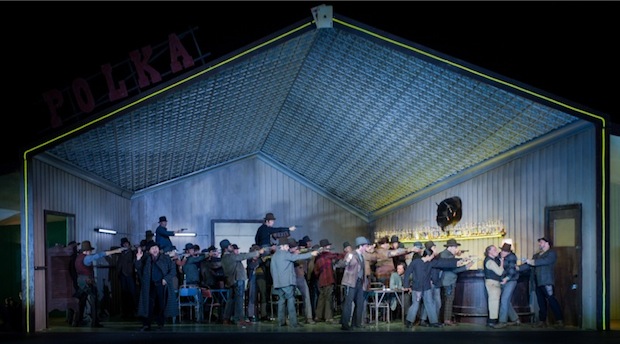Puccini’s La fanciulla del West is, one suspects, one of those works that modern audiences struggle to keep a straight face through. The hero, for a start, decides to call himself Dick Johnson. The piece’s Wild West trappings, long since staled into Hollywood cliché, still seem a strange fit for the operatic stage (it was performed here as The Girl of the Golden West, with Kelley Rourke’s translation delivered in a variety of American accents). The redemptive, into-the-sunset conclusion takes for granted a belief that capitalism in its most primitive, brutal form could leave a group of hardened Gold Rush miners capable of forgiveness. That it might have done, ENO’s programme told us, is not actually that wide of the mark, historically speaking. But we still rely heavily on Puccini’s score — so bracing in its wide-open vistas, but also so warm, melodic and irresistibly seductive — to shoot down our cynicism and disbelief.
Richard Jones is a director occasionally prone to cynicism himself, but while the heart of his new production for ENO is — thankfully — some way from its sleeve, it has an unapologetic sincerity and warmth, and the simplicity and beauty he brings to the final scene is utterly disarming. Throughout, though, the sharpness of his observations and the discipline and detail of the staging keep mushiness at bay.
Sure, it’s updated somewhat arbitrarily to the director’s favoured period, roughly mid-20th century, with a few negative knock-on effects. The downside of the clarity of Jones’s style is that it tends to highlight any conceptual edges that are left blurred. In Miriam Buether’s set, Minnie’s cabin looks too well appointed, the floor of its mezzanine level too solid for Johnson’s blood to drip through.








Comments
Join the debate for just £1 a month
Be part of the conversation with other Spectator readers by getting your first three months for £3.
UNLOCK ACCESS Just £1 a monthAlready a subscriber? Log in